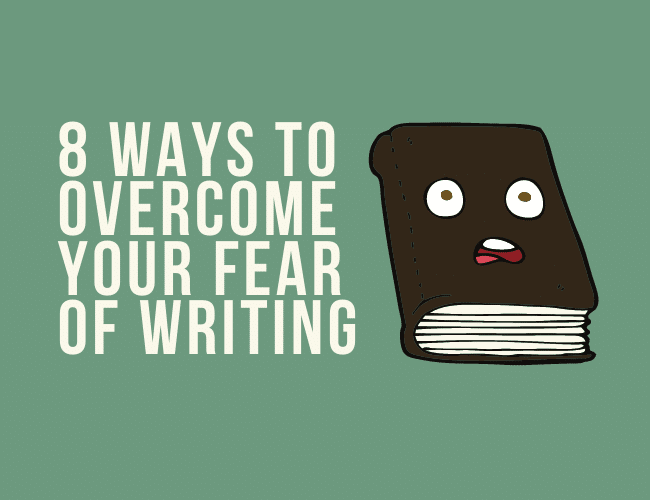Today I want to talk about fear. Fear of writing, fear of sharing your work, fear of publishing—and how you can overcome it.

Writers face fear on a day-to-day basis.
The self-doubt. The fear of failure. And, oh, the vulnerability.
Writing is hard enough with all the self-evaluation and doubt about your abilities. But then sharing your work with other people so they can critique or review it? CRINGE.
When you sink into that fear it debilitates you. If you let fear hold you back, you’re ensuring you never achieve your goals. You’ll never write that book and you’ll never get published. All because you were too scared.
8 Ways to Overcome Your Fear of Writing
It’s time to stop letting fear control you and get writing. Here’s how:
1. Do what scares you.
When you’re up against something that makes you cringe, ask yourself what the worst-case scenario is. Is it actually harmful? Unless it’s something like jumping from a bridge into a rocky river or stepping in front of a speeding vehicle, it’s probably not.
Fear is trying to keep you safe. It needs to learn that just because something is scary doesn’t necessarily mean that it’s detrimental to your health. Do what scares you, and keep doing it, and the fear will subside.
This includes fear of our own writing. I'm not saying you have to go write a 90,000 word novel. Start with a short story, or try out some writing prompts.
Aspiring writers might feel intiimdated because they don't think that they are a great writer. The reality is, you can never become a great writer unless you practice—and to practice, you have to write.
Embrace and overcome your fear by putting words down. Start writing, have patience with yourself, and worry about the rest later.
The blank page becomes way less scary as soon as you put words on it.
2. Stop procrastinating.
Your house is already clean enough. That TV show can wait. No, you don’t need to run to the store to pick up a bag of chips.
Figure out when the best time for you to write is and then write.
If you really, truly need a break to clear your mind, set a time limit. Ten minutes of scrubbing the grout with a toothbrush and then get back to your writing.
Ultimately, those who procrastinate will be more prone to writing off procrastination as writer's block—and the more time you spend away from writing, the scary it will become.
3. Learn from criticism.
Criticism is what everyone fears. Not just in writing, but in life. We all want to be liked, to be perfect, to be praised.
Your writing will not please everyone and that’s something you should realize and accept now. Criticism is much easier to take when you go into it knowing that fact.
Don’t just ignore criticism, though. Writing is like everything else in that it requires practice. You don't have to rank #1 on Amazon or make a bestseller list your first go (even though I won't argue that would be fantastic).
The first meal you cooked wasn’t a gourmet meal. The first time you dribbled a basketball wasn’t Lebron-level. Someone was there to point out what you were doing wrong and set you on the right path. They taught you how to get better.
That’s what criticism is: teaching.
It's not rejecting your work, which might be why some writers fail to share their work: because their fear of rejection is mistakenly associated with getting critiques.
Yes, sometimes it’s mean-spirited, especially in this age of internet trolls. But even in those nasty reviews, there’s normally something to learn from.
Find it. Use it. And do better next time.
4. Stop revising.
You want every sentence in your work to be perfect. I have a secret for you: you’ll never get there.
Your writing will never be perfect.
Not to you, not to your editors, and not to your readers. It’s impossible, so stop revising ad nauseam. At some point, you have to let it go and put the work out there.
Perfectionism can stunt your creative writing instead of empower it.
To avoid this, set a limit. I prefer three drafts. That’s it. Three and then I let it fly on its own.
What are you writing for? We'll never know unless you decide to share your work.
5. Set goals and move toward them.
Focus on milestones like daily word counts and deadlines (self-imposed or otherwise).
Writing a book is like summiting a mountain: you do it one step at a time. When you reach the top you might be a little exhausted and out of breath, but you’ll look back at all you’ve accomplished and feel proud.
Without these smaller milestones, it might be hard to finish your piece of writing, or even find the motivation to keep writing each day.
Stories are finished one day at a time, with hard work and a desire to grow your writing process.
Don't sweat the small stuff in your first drafts, like word choice. Instead, set a long term goal of continually learning how to write better and smaller milestones that will help you finish stories you start.
All of this is accomplished word by word, and by turning real and irrational fears into manageable tasks.
6. Embrace the fear of writing.
You’re going to be scared frequently in this business. My stomach still flips every time I submit a short story, even though I’ve submitted hundreds of times. It’s going to happen.
The trick is to acknowledge it and move forward. It didn’t kill you.
In fact, that little tingle of fear should be your signal to celebrate. You did what scared you and that’s amazing.
One book that a lot of writers really love on this subject is The War of Art by Steven Pressfield. If you're feeling discouraged or swallowed by your fear, check out this book for some motivation.
Even better, find and join a writing group like we have here at The Write Practice. Nothing helps you overcome your fears like a supportive community with a kindred creative spirit.
7. If your character can do it, so can you.
You don’t let your characters sit back on their heels because they’re scared, do you? I hope not, because if you do, you don’t have a story.
Your characters don’t have the luxury of sitting on the bench. They must make decisions and do something about the problem. And so should you.
Don’t let fear of writing take over your writing life. Decide to move forward, to write that book, to send out that manuscript. Decide and then do it.
8. Ask for help if you need it.
Don’t be afraid to ask for time to yourself so that you can write. Your family and friends will understand you need that time because writing is important to you.
Find a group of writers and readers that can go through your story and give constructive feedback. You can't improve in a vacuum.
Need to know what a day in the life of a flight attendant looks like, or the lingo of a truck driver? Ask them. Trust me, you’re not bothering them. People love talking about themselves.
In the same vein, if you need help with research, that’s literally what librarians are for. They’ll be glad to help.
Don’t let fear of asking for help stagnate your writing.
Embrace the Fear
I want to leave you with these words from Carrie Fisher:
Your fears are natural and normal. They're also not the end of the story.
Your task, the challenge for every writer, is to face that fear of writing, acknowledge it, and write, share, publish anyway.
Need extra motivation? Have you checked out The Write Practice’s 100 Day Book program? It’s the best way to stop letting fear of writing control you and get that book done. Click here to find more information on the course.
What scares you most about writing and/or the business side of writing? What are some steps you can take to overcome that fear? Let me know in the comments!
PRACTICE
Today I want you to spend fifteen minutes writing about a time you were scared to do something but did it anyway. Describe the exact feelings of fear you had. How did you feel after you'd done what scared you?
When you’re finished, share your work in the Pro Practice Workshop here (and if you’re not a member yet, you can join here).
Sarah Gribble is the author of dozens of short stories that explore uncomfortable situations, basic fears, and the general awe and fascination of the unknown. She just released Surviving Death, her first novel, and is currently working on her next book.
Follow her on Instagram or join her email list for free scares.





Who writes? Pensioner, professionals, housewives, kids or religious gurus or what class of people write?
My fear of writing is criticism, as English is not my first language. The 8 tips above have ignited my interest to write. That was my childhood dream. I would love to write short stories for my countries audience.
I am a high school teacher and I have read criticisms on everything that is posted on the internet, though there are many good comments .
Please advise me.
Understandable Naomi. Question, though: Would you rather write in English or your mother tongue?
Thank you! Needed to read this.
“7. If your character can do it, so can you.”
My characters can sprout wings and get coached by sentient rocks. They literally jump off cliffs with jagged rocks below.